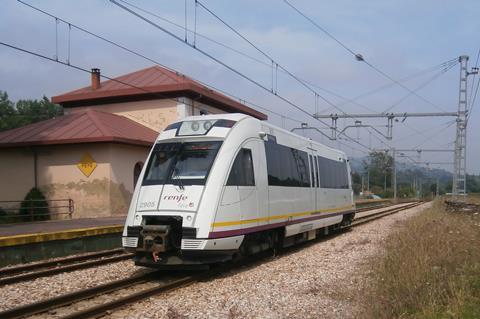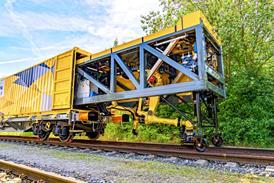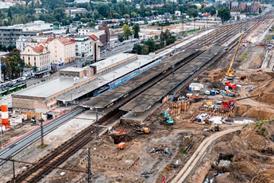
SPAIN: The production of multiple-units for use on metre-gauge lines in northern Spain has been delayed by confusion about infrastructure clearances on the routes and legal technicalities around the design of new rolling stock.
On January 23 Euskotren unveiled the first of four Class 940 electric multiple-units ordered from CAF in 2021. The event attracted attention in Galicia, Cantabria, Asturias, Castilla y León, Murcia and Madrid, as the Euskotren order had been placed the year after national operator RENFE awarded CAF a €258m contract in June 2020 to supply a total of 37 electric and electro-diesel multiple-units for operation on narrow gauge routes in these areas.
At the time it was anticipated that the first would be delivered in October 2024, but the project has run into problems.
In 2020 infrastructure manager ADIF supplied CAF with details of clearances on the ex-FEVE narrow gauge network, which were believed to comply with the GEE10 and GED10 standards as published in its 2019 Network Statement.
Spanish rules require new trains to be built according to the infrastructure documentation, but soon after winning the contract, CAF, which had built DMUs for FEVE in the late 2000s, informed RENFE that there was a possibility that the infrastructure did not in fact comply with the published specifications.
The metre gauge lines were originally developed in the late 19th and early 20th centuries by numerous private companies each with their own standards. As a result the lines have limited clearances, particularly where the track is canted, and very restricted side clearances in the many tunnels, some of which are on tight curves.
Over the past 2½ years the manufacturer, safety authority AESF, ADIF and RENFE have been considering potential solutions to the problems this causes. Modifying the infrastructure at locations with inadequate clearances would involve considerable time and expense, as well as service disruption, while redesigning the rolling stock to conform with the real clearances would be legally complex and mean a considerable reduction in spaciousness, comfort and potentially capacity.
On February 3 the four bodies reached an agreement which would allow the design of the new trains to be based on those currently in use on the ex-FEVE network – classes Class 2700 and 2900 – rather than the theoretical specifications. However, this will require modifying the contract, and approval of the new trains will involve a complex regulatory process. ADIF must also supply details of the infrastructure on the lines to be used by the new trains, and agree not to modify the critical areas.
As a result, delivery of the trains is now expected to be delayed by as much as three years.
Visiting Castro Urdiales in Cantabria on February 4, Transport Minister Raquel Sánchez said design work for the new trains would now be completed by summer 2023, and manufacturing would follow. The ministry would invite the provincial governments to participate in monitoring progress with the project, and an internal audit of RENFE and ADIF is to be undertaken to determine when and how the transfer of erroneous data to CAF took place.

















